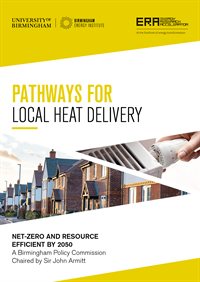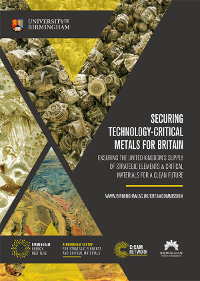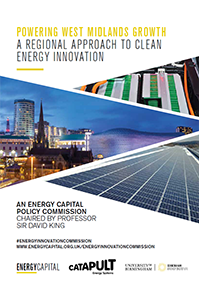Birmingham Energy Institute draws on the broad capabilities and expertise at the University of Birmingham and its strong relationship with collaborators from academia and industry, to produce studies and policy documents addressing the challenges facing today’s energy system.
These documents present the needs for development, highlight the opportunities and introduce possible solutions. The policy documents produced by Birmingham Energy Institute and its partners inform the decisions of policymakers.

Pathways for Local Heat Delivery Policy Commission - June 2022 (pdf 7mb)
The Pathways for Local Heat Delivery Policy Commission report examines all the components that are required to deliver a local heat solution and the barriers that need removing. Chaired by Sir John Armitt and delivered by the University of Birmingham in partnership with Energy Research Accelerator, the Commission have used the City of Birmingham as a case study and examined: planning; finance; consumer engagement and the role for mandation and zoning; local authority expertise and capacity; and challenges presented by the local infrastructure (e.g., gas and electricity grid).
 Securing Technology-Critical Metals for Britain Policy Commission - April 2021 (pdf -20mb) The UK must act now to ensure a stable supply of technology-critical metals (TCMs) essential for its transition to clean energy and the delivery of its ten point plan for a green industrial revolution. Securing Technology-Critical Metals for Britain outlines what the UK must do to address critical supply issue surrounding the technology-critical metals needed to achieve our Net Zero targets.
Securing Technology-Critical Metals for Britain Policy Commission - April 2021 (pdf -20mb) The UK must act now to ensure a stable supply of technology-critical metals (TCMs) essential for its transition to clean energy and the delivery of its ten point plan for a green industrial revolution. Securing Technology-Critical Metals for Britain outlines what the UK must do to address critical supply issue surrounding the technology-critical metals needed to achieve our Net Zero targets.

Heat accounts for over a third of UK carbon emissions and is the most difficult challenge we face en-route to net zero by 2050. This Policy Commission report established by the University of Birmingham and the CBI outlines the colossal challenge of decarbonising heat in the UK, what the challenge means for businesses, consumers and communities.
The report calls for the establishment of an independent, time-limited, impartial National Delivery Body (NDB) that will work with government on creating, coordinating and delivdelivering an overarching NDB. The proposed National Centre for the Decarbonisation of Heat (NCDH) could prove pivotal in the local delivery of the NDB’s work.

Powering West Midlands Growth: A Regional Approach to Clean Energy Innovation, March 2018 (pdf - 21MB)
Energy Capital together with the University of Birmingham and the Energy Systems Catapult have unveiled a policy commission report making the case for the creation of Energy Innovation Zones (EIZs) in the West Midlands. The report states the main focus of the EIZs will be to integrate low carbon technologies, to develop the business models and infrastructure needed to support new approaches to clean energy as well as overcome the regulatory barriers necessary for them to flourish. They will be designed to stimulate local clean energy innovation and drive productivity within the region, exports and growth.
 The Role of Hydrogen and Fuel Cells in Delivering Energy Security for the UK, March 2017 (pdf)
The Role of Hydrogen and Fuel Cells in Delivering Energy Security for the UK, March 2017 (pdf)
The paper explores the importance of a revised energy security framework. A more long-term view could underpin improvements in UK energy security through targeted future infrastructure investments in low-carbon technologies.
A clear and reliable policy framework will enable the Government, industry, and academia to work together to determine how best to ensure the country’s energy security during the transition to a low-carbon energy system.
 Clean Cold and the Global Goals, January 2017 (pdf - 9mb)
Clean Cold and the Global Goals, January 2017 (pdf - 9mb)
The report investigates how clean cold could help to achieve almost all of the United Nations’ (UN) Global Goals.
The report highlights that, as the world’s population heads to 9 billion by mid-century - increasing projected food demand by 60% - we will need far more cooling to conserve food, water and other resources; tackle poverty, hunger, health and climate change; and underpin growth and development.
Education and Training in Nuclear Decommissioning, December 2015 (pdf - 3mb)
The decommissioning of nuclear facilities is growing worldwide, creating job opportunities at all educational levels. Nuclear decommissioning is the industrial process of dismantling and decontaminating nuclear facilities and site remediation, removing them from regulatory control.
The report provides suggestions for helping the development, coordination and promotion of adequate education and training programmes at EU level in nuclear decommissioning.
Doing Cold Smarter report, October 2015 (pdf - 8mb)
Cold is vitally important to modern day life. It underpins the supply of food and medicine, enables the growth of data networks and makes buildings and transportation more comfortable. The lack of cold has massive social and environmental impacts.
The report explores the challenges and opportunities for the UK.
Sustainability Commission Report, February 2015 (pdf - 3mb)
This report explores how businesses across the UK are approaching the challenges of creating a sustainable business model. The Commission was made up of a collection of parliamentarians, and representatives from industry and academia, with the Commission co-chaired by Rt Hon Caroline Spelman MP and Professor Stephen Brammer from the University of Birmingham. The sustainability commission was conducted by the Industry and Parliament Trust, working in collaboration with the University of Birmingham.